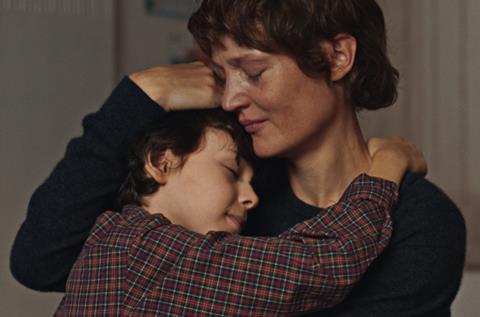Anna Cazenave Cambet’s second feature is adapted from the autofiction novel by Constance Debré

Dir/scr: Anna Cazenave Cambet. France. 2024. 134mins
Clémence (Vicky Krieps), a wife, mother and lawyer from a prominent family, walks out of her job and her marriage to find her true self. She pursues a career as a writer and embarks on a series of no-strings same-sex relationships. But her husband Laurent (Antoine Reinartz) sees her enthusiastic embrace of lesbianism and rejection of the bourgeois institution of marriage as a declaration of war; one in which his main weapon is access to their son, Paul (Viggo Ferreira-Redier). Although the running time and pacing of this sprawling Paris-based drama could be tighter, the laser focus of Krieps’ intense performance drives the picture and commands attention.
The lack of emotional connections can mean that it’s hard to feel particularly invested
This is the second feature from writer and director Anna Cazenave Cambet, following her 2020 debut Gold For Dogs, and she previously enjoyed some success with her 2016 short film Gabber Lover, which won the Queer Palme for short film in Cannes 2016. Love Me Tender, which is an adaptation of an acclaimed autofiction novel by Constance Debré, premiered in Cannes Un Certain Regard and picked up a special jury prize in Rio de Janeiro. Further festival interest seems likely following its most recent slot at LA’s American French Film Festival. The presence of the always magnetic Krieps will be a key selling point for distributors; the picture has already sold to numerous territories across Europe as well as Canada and Brazil.
Debré’s uncompromising voice is present throughout the film — passages of her writing are narrated by Krieps in a throaty growl. And it’s this aspect that makes the film rather more complex, uncomfortable and unexpected than the custody battle domestic drama that it initially seems to be. Clémence is in conflict with her petty, vengeful husband certainly, and she collides with the bureaucratic structures of the child support organisations and the family courts. But she’s also wrestling with herself and an inclination to reject the softness and selflessness of motherhood.
Clémence knows how this narrative pans out — she’s a writer after all — and she’s aware that a woman who walks out on her own child tends to be viewed as the villain of the story. Her decision to leave and to write with candour about her sexual conquests, her rejection of the stability of law as a career in favour of a rootless, insecure Bohemian existence; it’s all used by her husband’s attorney as evidence of her unfitness, not just as a mother but as a human being. Clémence loves her child – Krieps doesn’t overstate the anguish but there are often flickers of pain in her face – and she’ll fight to see him. But not at the expense of the woman she is only now learning how to be.
There’s a spirit of punk confrontation of Debré’s writing; she is something of a literary sensation in her native France, not least because she hails from political aristocracy and a family which has been described as the ‘French Kennedys’. But this doesn’t always translate to Cambet’s filmmaking. The muscular electronic score by Maxence Dussere has a brash swagger to match the character’s forthright energy. The scenes of anonymous abandon in gay clubs and the hook-ups in swimming pool cubicles jangle with electricity. But some of the other scenes – the rare shared moments with Paul for example – can tip over into unexpected sentimentality.
Then there’s another issue – all the casual sex is key to Clémence’s voyage of self-discovery but the lack of emotional connections can mean that it’s hard to feel particularly invested in each new assignation. Even with the considerable draw of a prowling, panther-like Krieps stalking around Paris’s queer subculture, the picture would benefit from a leaner structure and a tighter running time.
Production company: Novaprod Cinéma
International sale: Be For Films pamela@beforfilms.com
Producers: Raphaëlle Delauche, Nicolas Sanfaute
Cinematography: Kristy Baboul
Production design: Mathilde Poncet
Editing: Joris Laquittant
Music: Maxence Dussere
Main cast: Vicky Krieps, Antoine Reinartz, Viggo Ferreira-Redier, Monia Chokri, Ji-Min Park, Aurélia Petit, Tallulah Cassavetti, Oumnia Hanader, Salif Cissé, Malou Khebizi, Julien De Saint-Jean, Jean-Baptiste Durand, Manuel Vallade, Féodor Atkine
























